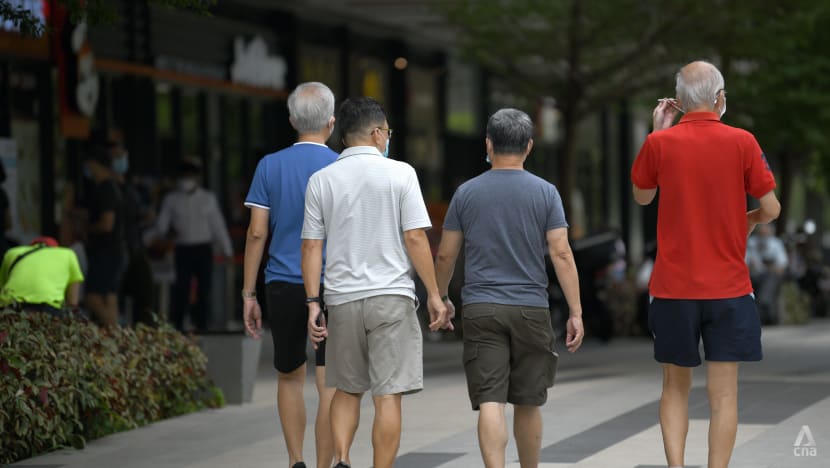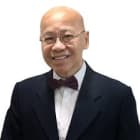Commentary: SingaporeŌĆÖs ŌĆśsuper-agedŌĆÖ society needs a place for its men
For many men, the idea of a ŌĆ£senior centreŌĆØ is at odds with macho-man ideals of strength and independence, says 78-year-old Dr William Wan.

A group of elderly men walking along Paya Lebar Square. (Photo: Calvin Oh/┬ķČ╣)

This audio is generated by an AI tool.
SINGAPORE: IŌĆÖm 78 and IŌĆÖve seen how retirement has hollowed out the lives of some men my age. I still work and intend to continue working until my health prevents me from doing so.
Not everyone has that option though. For those who leave the workforce, the challenge of finding purpose and connection can be daunting.
ThatŌĆÖs why when Prime Minister Lawrence Wong spoke about building Age Well Neighbourhoods during the National Day Rally, I found myself listening closely.
As Singapore prepares to become a ŌĆ£super-agedŌĆØ society next year - with more than 21 per cent of the population expected to be over 65 - one highlight of the Age Well Neighbourhoods initiative is to create more spaces to facilitate community activities for seniors.
Mr Wong noted that such activities, however, ŌĆ£somehowŌĆØ appeal more to women than men.
IŌĆÖve got a pretty good guess why this is so.
THE MACHO-MAN SYNDROME
First, gender issues are tricky territory, and we must be careful not to stereotype. But we do know that there is a gender difference and differentiation between men and women.
John GrayŌĆÖs book, Men Are From Mars, Women Are From Venus, is still relevant even though it was published more than three decades ago. His metaphor that men and women are from different planets, with inherently different socio-psychological characteristics, communication styles and emotional needs, helps explain why certain activities do not appeal to men.
In many cultures, and especially in AsiaŌĆÖs largely patriarchal societies, masculinity has long been equated with independence, stoicism and self-reliance.
Boys of my generation were taught to be tough. That meant emotions were to be controlled (boys donŌĆÖt cry), problems solved alone (no need to seek help), and success achieved by competing (I am my own hero).
To seek emotional support was to reveal vulnerability, and that was never considered ŌĆ£manlyŌĆØ. This emotional guardedness makes it harder for men to form the kind of deep, meaningful friendships that matter most in later life.
THE WORKING MAN SYNDROME
Second, many men of my generation anchor their identity in the work they do. Their career success defines their masculinity. They take great pride in being the traditional breadwinner, the respected provider for the familyŌĆÖs needs. They allow their career to be the measure of their self-worth and value to family and society. It is almost a badge of honour to be a workaholic, putting in long hours and burning weekends.
In the pursuit of their careerŌĆÖs upward trajectory, many sacrifice their social life outside their immediate family. Friendships and hobbies are not their priorities, and over time, their circle of social relationships shrinks. By the time they reach retirement age, some can even count the number of close friends they have on one hand.
This is evidenced by a National University of Singapore study in 2020, which found that elderly people may feel lonely and isolated even while living with family. The study, which surveyed 17,107 Singaporeans aged 61 to 96, also showed that men who lived alone were twice as likely as women to be disconnected.
ŌĆ£Given their traditional role as wage earners, men have smaller social networks and report fewer social interactions than women,ŌĆØ the study noted.
Before they realise it, many men face a serious identity crisis once they retire. I know of several friends who, soon after leaving the workforce, retreat into a reclusive lifestyle. Some became completely uncontactable, refusing to leave the house to socialise and losing interest in almost everything.
THE NOT-FOR-MEN SYNDROME
Third, boys of my generation grew up climbing trees, flying kites, kicking balls and competing in outdoor sports.
As we grew older, some of us took to fixing bicycles, tinkering with motorcycles or even car engines. Our interactions were almost always purpose-driven, where we played to win, built things and solved problems.
These "shoulder-to-shoulder" activities bonded us through shared tasks and strenuous exertion. Sitting around for polite, ŌĆ£face-to-faceŌĆØ parlour conversations and discussions without a purpose did not interest us.
So, it is not hard to see why many men find it hard to embrace the idea of a ŌĆ£senior centreŌĆØ or "activities for seniors". Those phrases alone conjure images of decline, frailty and dependency, which is at odds with the macho-man ideals of strength and independence.
There is also a perception that centre activities cater more to female interests, for example, crafts, quilting, bingo, book clubs and dance classes.
While there are exercise classes, they often lack the rigour of competition or physical challenge that appeal to many men. Passive lectures or purely social events have no appeal.
Mr WongŌĆÖs observation that kickboxing, cardio drumming and carpentry workshops should be on the programme is spot-on. Attracting older men requires intentionality, creativity, and a willingness to challenge traditional senior centre models.
It's not about excluding women, but about broadening the programme sheet to include activities that resonate with menŌĆÖs interests and socialisation styles.
Studies have shown that older men are generally more vulnerable to severe loneliness and social isolation than older women, particularly after major life transitions like retirement or widowhood. This pattern holds across diverse cultures, though cultural norms shape how loneliness manifests.
Male loneliness and social isolation are often described as a quiet crisis with loud consequences. Of the 314 reported suicide deaths in Singapore last year, 64.3 per cent were men.
Mr WongŌĆÖs call to plan for more male-oriented activities in our Age Well Neighbourhoods couldnŌĆÖt be more timely. There is an urgent need to redesign our activity centres to attract senior men, including those who believe they donŌĆÖt need anyone.
And maybe, just maybe, theyŌĆÖll discover they do.
Dr William Wan is a practising lawyer and former General-Secretary of Singapore Kindness Movement.













